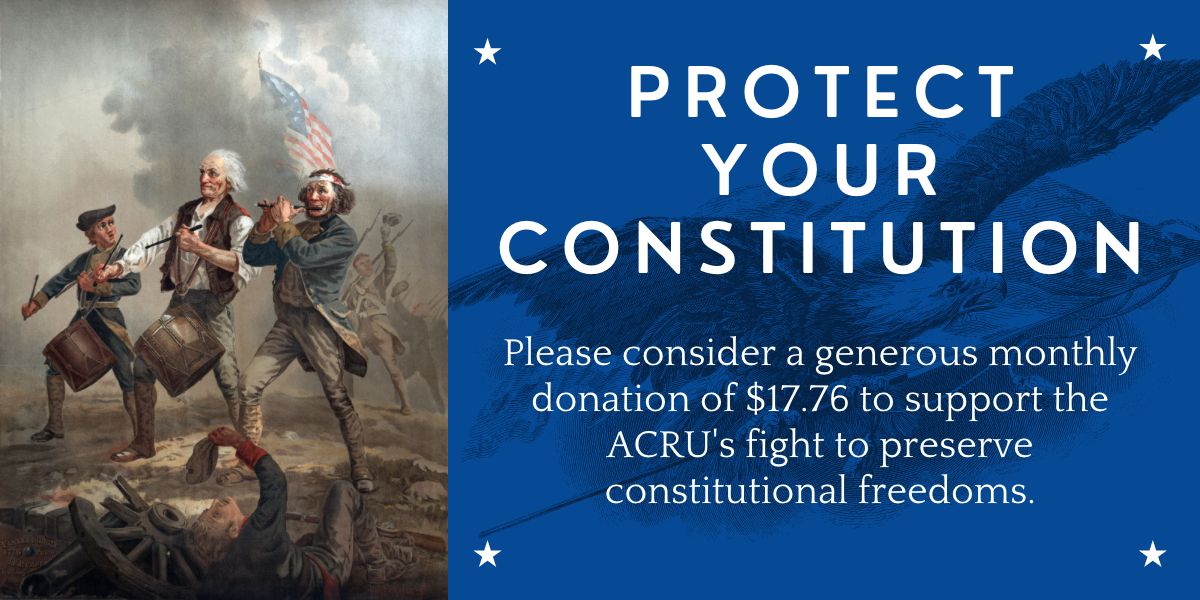Peter Ferrara: Rush's fans have rights, too
ACRU Staff
April 5, 2009
This op-ed originally appeared in The Washington Times on April 5, 2009.
Scalia cites danger of limiting what can be heard and when
While President Obama’s Federal Communications Commission (FCC) prepares to attack conservative talk radio with some version of the Fairness Doctrine, Supreme Court Justice Antonin Scalia in open court last week may have thrown a bombshell into those plans.
During oral argument in the case of Citizens United v. Federal Elections Commission, Justice Scalia said, “Do you think that there’s a possibility that the First Amendment interest is greater when what the government is trying to stifle is not just a speaker who wants to say something but also a hearer who wants to hear what the speaker has to say?”
In other words, Justice Scalia raised the possibility that Rush Limbaugh’s 20 million fans, as well as the listeners to 2,000 other radio talk shows, have constitutional rights, too. In particular, they have a right to choose what they want to listen to, or to watch, without government interference.
In fact, the courts have long recognized such a constitutional right to listen, as well as the free speech right of a speaker to speak. In Rossignol v. Voorhaar, the U.S. 4th Circuit Court of Appeals held in 2003 that the First Amendment protects both a speaker’s right to communicate information and ideas to a broad audience and the intended recipients’ right to receive that information and those ideas.
Similarly, in U.S. West Inc. v. FCC, the U.S. 10th Circuit Court of Appeals held in 1999 that the two components of effective speech are a speaker and an audience, and a restriction on either of these components is a restriction on speech. In De La O v. Housing Authority of City of El Paso, the 5th Circuit added in 2005 that the right to receive information is as equally protected under the First Amendment as is the right to convey it.
Several such rulings can be found in every federal circuit court. The U.S. Supreme Court has also recognized this right to listen and to watch. In U.S. v. Playboy Entertainment Group Inc., a pornography case, the court ruled that under the First Amendment’s free speech clause, the citizen is entitled to seek out or reject certain ideas or influences without government interference or control. Is there now more constitutional protection for pornography than political speech?
Justice Scalia’s question raises the possibility that this constitutional right to listen or to watch will be relevant to the regulation the FCC is now preparing for talk radio. There has been much discussion that the FCC might adopt so-called localism rules that would force stations to drop nationally syndicated talk shows. But if those national talk shows have high local ratings, then such regulation might be found to violate this constitutional right to listen by the local audience.
That would be especially true if courts found that the localism regulations were adopted for the purpose of banishing conservative talk critics of the Obama administration, which would amount to unconstitutional viewpoint discrimination.
Citizens United is a nonprofit, 501(c)(4) corporation founded by citizens who want to communicate and advance their ideological viewpoints to the general public, a fully constitutionally protected activity. In 2007, Citizens United financed from its own corporate treasury the production of a feature-length (90 minutes) documentary film about Hillary Rodham Clinton. The movie focused on past Hillary Clinton scandals, such as the firing and subsequent criminal prosecution of the White House Travel Office staff, repeated campaign finance law violations and the presidential pardon of Puerto Rican terrorists convicted of murder while Mrs. Clinton was seeking Puerto Rican activists’ endorsement for her New York Senate campaign.
The Federal Elections Commission prohibited broadcast of the movie in 2008, when Mrs. Clinton was running for president, because its financing did not comply with McCain-Feingold restrictions. I filed a brief with the Supreme Court on behalf of the conservative American Civil Rights Union supporting Citizens United, arguing in particular that the broadcast prohibition violated the constitutional right to watch and listen to the movie by citizens who wanted to do both. (More about the constitutional right to listen can be found at the Web site www.freedomtolisten.org.)
If the final opinion in the Citizen’s United case further recognizes this right, that will be an important precedent for protecting the freedom of conservative talk radio to continue to broadcast.
Peter Ferrara is general counsel of the American Civil Rights Union and director of Entitlement and Budget Policy for the Institute for Policy Innovation.
JOIN ACRU's PATRIOT CLUB



